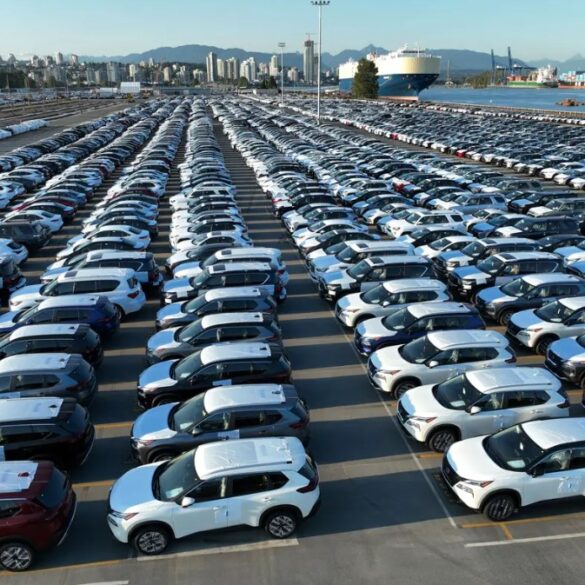
New cars are parked in rows after arriving by ship at Annacis Island in Delta, British Columbia, Canada, on July 31, 2023. (Reuters/Chris Helgren)
Canadians have started to receive payments as part of a $78 million auto parts class-action settlement involving new vehicles purchased or leased between 1998 and 2016.
The settlement relates to the alleged price fixing of certain automotive parts, which is said to have caused Canadians to pay too much for automotive parts and certain vehicles, according to the claims administrator.
The affected automakers include BMW, Chrysler, Ford, General Motors, Honda, Jaguar, Mazda, Nissan, Subaru, Toyota, Volkswagen, and Volvo. Canadians who purchased or leased a new passenger car, sport utility vehicle, van, or light truck from an applicable automaker between 1998 and 2016 were eligible to apply for settlement funds.
The claims administrator notes that the class actions were against the parts manufacturers who allegedly price-fixed auto parts, and that no wrongdoing is alleged against the automakers. The automakers were not defendants in the class actions.
Payments began on Aug. 28 and are set to be a minimum of $25 per claim, not per vehicle. Eligible Canadians will receive their settlement payments via e-transfer, which are valid for 30 days after issuance, or by cheque, which are valid for four months. Those who have sold the relevant vehicles are still eligible to submit a claim. The claims administrator says the deadline to file a claim has now passed.
The settlement relates to 23 class-action lawsuits that took place in Ottawa, British Columbia, and Quebec over alleged automotive part manufacturers fixing the prices of certain automotive parts. The lawsuits were led by law firms Siskinds, Sotos, Camp Fiorante Matthews Mogerman (CFM), and Siskinds Desmeules.
The affected auto parts include air conditioning systems, alternators, braking systems, door latches, fuel injection systems, manual steering columns, oxygen sensors, power window switches, radiators, spark plugs, starters, and windshield wipers, among several other parts.
While this is the second distribution of the settlement, the first involved $25 million for a smaller set of affected vehicles, and for which payments were issued in March 2021. The claims administrator expects at least one more distribution in the auto parts cases, but only those who applied for settlement benefits in this distribution will be eligible for benefits in future distributions for the same vehicle brands and years.
In June, Siskinds said that auto parts class action cases make up “the largest antitrust investigation in history—in terms of the number of affected parts, implicated parties, and fines imposed.”
“Price-fixing conspiracies are prohibited by the Competition Act,” CFM partner David Jones said in a June 28 statement. “They are harmful to the Canadian marketplace, causing businesses and consumers to pay too much for goods and services.”
